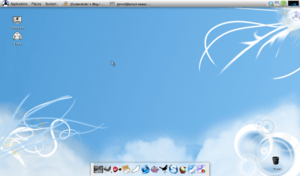Aurora (operating system)
 | |
 | |
| OS family | Unix-like |
|---|---|
| Working state | Discontinued |
| Source model | Open source |
| Latest release | 3.0 / 15 May 2009 |
| Available in | English |
| Update method | APT (front-ends available) |
| Package manager | dpkg |
| Kernel type | Linux |
| Default user interface | GNOME (+ Ubuntu Netbook Edition for NBR version) |
| License | Mainly the GNU GPL / Various others |
| Official website | www.auroraos.org |
Aurora (formerly named Eeebuntu) (not to be confused with EasyPeasy, formerly known as Ubuntu Eee) is an operating system for netbooks. The current version is based on Ubuntu, though newer versions will be based on Debian Unstable.[1] Eeebuntu was designed originally for the Asus Eee PC line of netbooks.
Four versions are available for install: Standard, NBR (standard with Ubuntu Netbook Edition), Base and LXDE.
Features
- Works out of the box on Asus Eee PC 700, 701, 900, 900A, 901, 904HD, 1000, 1000H, 1000HA, 1000HD and 1000HE. Recent versions also work out of the box on the Acer Aspire One A110L.
- Includes an Asus Eee PC specific kernel which is tuned for Eee's hardware (e.g., Wi-Fi module, function keys).[2]
- VLC, Flash and Java installed out of the box.[2]
- Can create a bootable USB stick or SD card using UNetbootin.
- Integrates the eeepc-tray ACPI (now changed to Jupiter) utility to control ACPI events and toggle certain devices on the Eee on/off.
History
Eeebuntu was created in Dec 2007 by Steve Wood. At that time Eeebuntu was little more than a collection of scripts applied to a live Ubuntu image. As the project matured the post install scripts were dropped in favour of a modified kernel that contained pre-compiled hardware drivers.
Other developers took interest in the project and by December 2008 Eeebuntu had grown into a Linux distribution in its own right with around 1,500 registered forum users. Eeebuntu 2.0 was the first Eeebuntu version to completely remove Ubuntu branding and use its own artwork and themes.
Eeebuntu has 4 versions:
- Base - 565MB ISO footprint, reduced number of pre-installed applications.
- Standard - A compiz enabled full desktop with a number of pre-installed applications.
- NBR - Using the Ubuntu Netbook interface with a number of pre-installed applications.
- LXDE - Utilising the LXDE desktop and a number of pre-installed applications.
Current release
The latest release of Eeebuntu is based on Ubuntu 9.04. It addresses a number of issues with the integrated Intel graphics cards and provides Eee PC specific optimization.[3]
See also
References
- ↑ Eeevolution - Eeebuntu 4.0 and beyond Archived July 26, 2011, at the Wayback Machine.
- 1 2 Best netbook-friendly Linux distros
- ↑ EEEBUNTU 3.0 REVIEW Archived March 28, 2010, at the Wayback Machine.